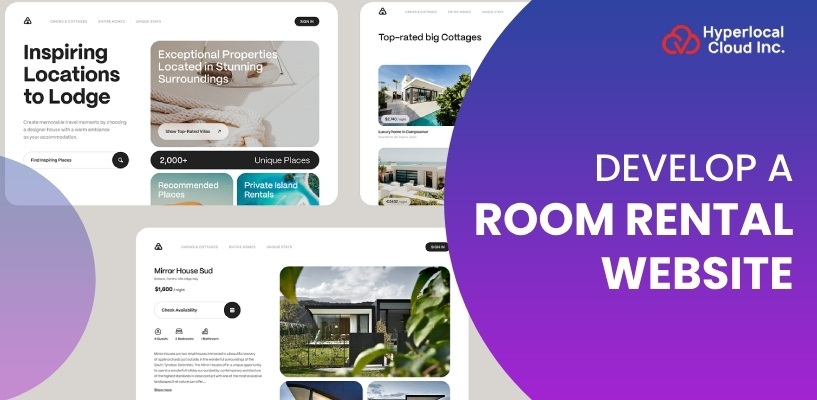Develop A Room Rental Website

The digital transformation of businesses has captured various eyeballs, and real estate is one of them. Various property owners nowadays look forward to attracting more customers and gaining maximum profits. This is only possible with a well-developed room rental website with exceptional features that will skyrocket sales.
Accelerate your real estate business with a top-notch room rental website with state-of-the-art technologies to offer highly personalized experiences, increase scalability, and streamline operations.
Crucial Steps To Build A Room Rental Website
Requirements Gathering
Understand the business requirements and target audience. Core features involve a product catalog, including clothing categories, available sizes, and stock levels. A user registration feature, secure payment gateways, and a robust inventory management system would also be involved. The rental duration system, delivery tracking, reviews, and an admin dashboard for managing orders, returns, and customer support would also be included. Precise requirements assist in defining the scope of the project and guide the design and development phases.
UI/UX Design
The design phase covers how the website will be intuitive to the users so that navigation becomes simple. In this phase, the creation of wireframes marks the mapping of the website’s structure. Finally, high-fidelity prototypes allow visualization of the final version. The site is ensured to be responsive and mobile-friendly, thus optimizing experience over various devices. User journey mapping is critical to enable users to be gently guided from catalog browsing to check-out or renting out. Consistent brand, beautiful visuals, and clear call-to-action buttons are outstanding design elements that drive engagement and conversion.
Technology Stack Selection
Proper technology stack selection is vital to ensuring that the website’s performance scales. Front-end development uses HTML, CSS, and JavaScript, with frameworks like React, to provide dynamic and front-end development. Based on project requirements, Node.js, Django, and Ruby on Rails are the most common choices for back-end development.
Relational databases like MySQL or PostgreSQL will manage inventory, user data, or rental transactions. APIs for payment processing, shipping, and other third-party integrations will complement the technology stack’s functionality.
Development
This stage involves both the website’s front end and back end. Frontend developers’ tasks include implementing UI/UX design to implement a responsive layout and user-friendly interactions. The backend developers will work on the server-side logic to integrate user authentication, payment processing, inventory management, and all rental functionalities.
Moreover, it ensures the implementation of main features such as the shopping cart, order tracking, and return system. Security protocols include SSL encryption, data protection, and secure login methods to the website. Admins will also have a backend dashboard to keep track of stock and customers’ orders so that the business can run with minimal hindrances.
Quality Assurance
Testing involves removing bugs from a website so that it will work flawlessly on all devices and browsers. During this phase, various components of the website are tested through different testing techniques, such as penetration, unit, integration, and system testing. It also encompasses security testing checks for vulnerabilities and data protection. This stage is crucial as it improves performance testing and ensures the site loads fast and scales well.
Deployment and launch
After the website passes all the tests, it goes to deployment. Here, to secure the site, hosting on platforms like AWS or Google Cloud and configuring domains are performed. Following development comes the launching stage, where the site is migrated from the development server to a production server, making it accessible to end-users.
Maintenance
This stage ensures that the website remains functional, secure, and updated. It involves regular bug fixes, security patches, and website performance optimizations. Some customer feedback must be watched for possible problems or improvements. The website may call for a scale in growing business through optimization of server, improvement of database, and development of new features. Constant updating-sometimes related to improving the user interface and other times to backend functionality-reaffirms that it remains competitive and as expected by users.
Revolutionize Your Business With A Room Rental Website Development
Must-Have Features Of Room Rental Website
User Management
Helps admin create, update, and delete user accounts and allows tenants and landlord registrations to be approved or rejected.
Profile Management
Helps in the in-depth management of clients’ landlord profiles with information about properties and rental policies. It also helps upload legal and tax documents such as property insurance or licenses.
Room Listing Management
Allows landlords to approve or reject the submitted room listings. They can even modify or mislead listings promptly and monitor the flagged or reported listings for conformity.
Analytics
Enables admin to gain meaningful insights and view active users, revenue, and the number of usages on the site while keeping track of user engagement and conversion rates.
Chat and Support
It provides a secure medium for the guests and the landlords to communicate with each other and even with the website support team.
Booking and Reservation System
This feature helps guests make reservations for their stay in just a few taps without hassle.
Content Moderation
Helps the platform owners to monitor and approve reviews and ratings for rooms and landlords. Issues between renters and landlords, and vice versa, are looked into.
Feedback Attribute
Enables the guests to post reviews and ratings for rooms where they are staying.
Payments and Transactions
It allows a seamless payment process for rent, deposits, and other fees. It also tracks transaction history and manages refunds or disputes.
Instant Alerts
With this feature, notifications about new features, policy changes, reminders on payment due dates, lease expirations, etc, are swiftly sent.
Issue Reporting
Helps in receiving maintenance requests and issues reports from tenants and solves them on time.
Advanced Search Filters
Makes it convenient for the users to narrow down the options for location, facilities, price, etc.
Ready to Build Your Room Rental website?
Business Model Of Room Rental Website
On the surface level, the online marketplace offers top-notch hospitality services to customers on short- and long-term rentals. There are various popular websites like Airbnb, Vrbo, Zillow, etc.
Below, we have depicted the business model, including what it offers and how the website is operated.
- The host lists their spaces or properties on the website with a specified price through their accounts.
- The website automatically calculates the rental value per night depending on the information.
- Furthermore, when the renter books the property, the website takes a specified percentage of the rental fee as a commission.
Business Benefits Of Developing A Room Rental Website
Wider Market Reach and Exposure
With internet rentals, the customer pool is not restricted to customers in the locality but can be miles away or outside a country, so there are more prospects.
Any website will attract targeted audience profiles; for instance, if the company mainly rents out co-working spaces, it’s more likely to get queries from freelancers or remote workers, whereas an event venue will get inquiries from companies that want to hold events for their companies, etc.
Efficient Booking & Payment Systems
An online booking system makes renting space smooth. Customers can choose dates, check availability, and book accordingly with a single click. Complete payments, deposits, or subscriptions can be processed in an online secure payment portal, saving time and administrative overheads while ensuring timely payments.
Competitive Advantage
A modern, efficient, and customer-responsive online room rental website creates a distinct mark for potential customers who view a well-developed online rental platform as competing against traditional offline rental businesses.
The online visuals display the interactive floor plan and virtual tours with flexible payment plans, differentiating the business from the competition.
Customer Engagement & Retention
To attract repeat business, businesses can present loyalty programs or offer repeat customers discounts or special deals for long-term bookings. Automated messages, such as booking reminders, promotions, and follow-up emails, keep the tenant engaged and more likely to return.
Streamlined Operations
A single dashboard simplifies the process of coordinating space availability, amenities, and details, helping to keep track of many locations, dates, and customer bookings.
Analytics and Insights
The online room rental website gains valuable insights about customers’ preferences, booking rates, and revenues and facilitates businesses’ alteration of pricing, marketing, and space.
Booking rates, revenue per space, and other retention measures enable businesses to understand their performance and make informed data adjustments to further optimize operations.
Scalability and Growth
The room rental website helps scale the rental business by adding more properties or spaces to their online listing without significant additional overhead. As the company grows, the higher volumes of bookings, payments, and customer interactions can be handled with minimal manual intervention.
Get A Free Cost Estimation For Your Room Rental Website!
Room Rental Website: Popular Revenue Model
Transaction Fees
It is actually the prime source of income, and website owners can charge a specific percentage of fees from both guests and landlords when making the reservation.
Premium Features
Access to the 3D view, virtual tours, and high-quality property images is made available to the guests through the superior attributes for which an additional fee is charged.
Advertising
The display of third-party ads on the website helps generate additional sources of revenue.
Commission fees
The website owners charge a certain amount to facilitate booking services on their platform.
Listing Fees
The property owners charge such fees to list their properties on the website to gain online visibility and potential tenants.
Conclusion
Building a room rental website is a profitable venture that allures business on a larger scale. An online rental marketplace is a perfect destination for real estate owners to connect with their potential prospects and amplify their business.
Kickstart your development journey with us. We are a team of noteworthy developers who will help you create a custom-fit website with visually appealing designs, images, a fantastic layout, and an intuitive interface that will grab the attention of the end-users.





